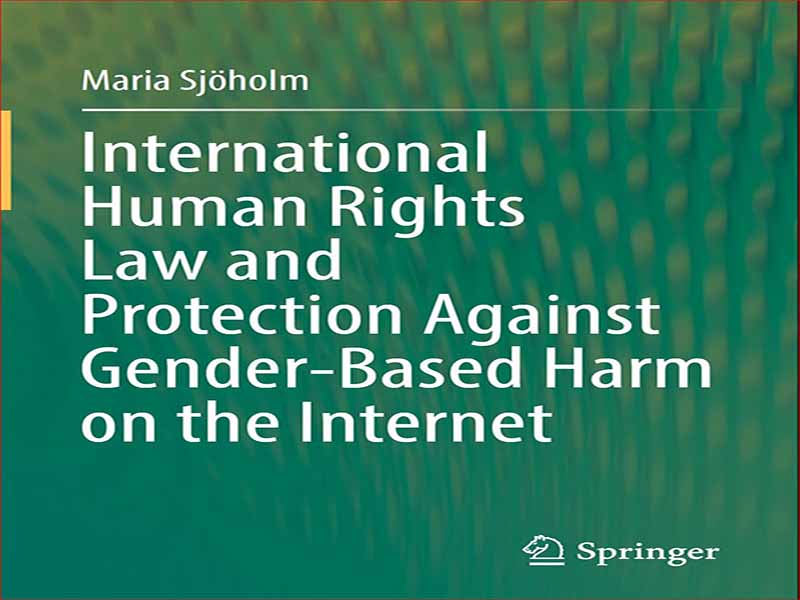- عنوان کتاب: International Human Rights Law and Protection Against Gender-Based Harm on the Internet
- نویسنده: Maria Sjöholm
- حوزه: حقوق بشر
- سال انتشار: 2022
- تعداد صفحه: 265
- زبان اصلی: انگلیسی
- نوع فایل: pdf
- حجم فایل: 3.36 مگابایت
اینترنت به طور فزایندهای برای فعالیتهای مختلف انسانی در حوزههای عمومی و خصوصی مانند آموزش، سرگرمی، کار، تجارت، جستجوی اطلاعات و بحثهای سیاسی ضروری است، که گواه این واقعیت است که تقریباً پنج میلیارد نفر در سال 2021 از اینترنت استفاده میکردند. اگرچه اینترنت در ابتدا به عنوان یک ابزار تحقیقاتی علمی و شبکههای ارتباطی نظامی طراحی شده بود، اما اینترنت در مرحله فعلی خود عمدتاً به عنوان یک وب اجتماعی مورد استفاده قرار میگیرد که مشخصه آن محتوای تولید شده توسط کاربر و شبکههای اجتماعی است. کاربران ممکن است محتوای خود را ایجاد، آپلود و اصلاح کنند و از طریق رسانه های مختلف با سایر کاربران تعامل داشته باشند. به طور همزمان، هم کسبوکارها و هم دولتها با انتقال تدریجی خدمات به اینترنت، هدفشان کاهش هزینهها و افزایش دسترسی به اطلاعات است. اخبار، کتاب ها و تحقیقات به صورت آنلاین در دسترس هستند و اینترنت ابزار اصلی دسترسی به اطلاعات برای جوانان است. با توجه به این ویژگیها، اینترنت بستری ویژه برای گروههای اجتماعی با دسترسی محدود به حوزه عمومی است، به عنوان مثال، به دلیل تبعیض و/یا موانع اجتماعی-اقتصادی، به عنوان وسیلهای برای دسترسی به اطلاعات، ایجاد دانش، بیان ایدهها. و بسیج تغییرات اجتماعی و سیاسی. همانطور که گزارشگر ویژه سازمان ملل در مورد آزادی بیان اشاره کرد، اینترنت شیوه های جدیدی از مشارکت شهروندان را فراهم می کند و وسیله ای ضروری برای دموکراسی است. با توجه به اهمیت این حوزه، دسترسی به فناوریهای اطلاعات و ارتباطات (ICT) به طور فزایندهای از طریق حقوق بینالملل حقوق بشر مورد توجه قرار میگیرد، که در درجه اول در آزادی بیان گنجانده شده است، هم برای انتشار و هم برای دریافت اطلاعات. برای مثال، دادگاه اروپایی حقوق بشر (ECtHR) اینترنت را یکی از ابزارهای اولیه می داند که افراد از طریق آن می توانند از آزادی بیان خود استفاده کنند. دسترسی به اینترنت نیز برای اهدافی مانند حق توسعه، دموکراسی و برابری جنسیتی مهم تلقی می شود. چنین جنبه های مثبتی به طور مشابه در چارچوب قانون بین المللی حقوق بشر زنان مورد توجه قرار گرفته است. برای مثال، پیشرفتهای فناوری ممکن است به ایجاد شبکهها، پر کردن شکافهای فاصله فیزیکی و توانمندسازی زنان، به ویژه در مناطق روستایی با دسترسی محدود به خدمات دولتی مانند مراقبتهای بهداشتی، کمکهای قانونی و حمایت از قربانیان کمک کند. اینترنت همچنین اشتغال، تحصیل و مشارکت سیاسی را تحریک می کند. علاوه بر این، فناوری اطلاعات و ارتباطات بسترهایی را برای شهروندی جنسی جدید فراهم میکند و به زنان امکان میدهد تا زمینههایی از تمایلات جنسی خود را که ممکن است در محیط فرهنگی آنها مجاز یا مناسب تلقی نشود، کشف کنند. معتقد بودند که اینترنت آزادی بیشتری برای آنها فراهم می کند. بنابراین اینترنت – همچنین توسط بسیاری از محققان حقوقی فمینیست – به عنوان یک حوزه رهایی بخش برای زنان مورد استقبال قرار گرفته است که در آن از اهمیت نقش های جنسیتی کاسته شده است.
The Internet is increasingly indispensable to various human activities in the public and private spheres, such as education, entertainment, work, commerce, information-seeking, and political debate, evidenced by the fact that approximately five billion people were using the Internet in 2021. Although originally designed as a scientific research tool and military communications network, the Internet is in its current phase largely utilised as a social web, characterised by user-generated content and social networking. Users may create, upload and modify their own content and interact with other users through a variety of mediums. Simultaneously, both businesses and governments aim to reduce costs and increase accessibility to information by gradually shifting services to the Internet. News, books and research are available online, with the Internet being the primary means of accessing infor- mation for young people. In view of these features, the Internet is a particularly important platform for social groups with limited access to the public sphere, for example, due to discrimination and/or socio-economic impediments, as a means of accessing information, building knowledge, expressing ideas and mobilising social and political change. As noted by the UN Special Rapporteur on the Freedom of Expression, the Internet provides novel modes of citizen participation and is an essential vehicle for democracy. Given the importance of this sphere, access to information and communication technologies (ICTs) is increasingly addressed through international human rights law, primarily viewed as being embedded in the freedom of expression, both to impart and receive information. For example, the European Court of Human Rights (ECtHR) considers the Internet to be one of the primary means through which individuals are able to exercise their freedom of expression. Internet access is also viewed as important to such objectives as the right to development, democracy and gender equality. Such positive aspects have similarly been addressed within the framework of women’s international human rights law. Technological advances may, for example, aid in creating networks, bridge gaps of physical distance and serve to empower women, especially in rural areas with limited access to state services such as health-care, legal assistance and victim support. The Internet also stimulates employment, education and political participation. Addition- ally, ICTs provide platforms for a new sexual citizenship, allowing women to explore areas of their sexuality that may not be allowed or considered appropriate in their cultural setting.11 In a global study from 2013, 85% of women consequently ; held that the Internet provided them with more freedom. The Internet has thus been hailed—also by many feminist legal scholars—as a liberating sphere for women where the significance of gender roles is diminished.
این کتاب را میتوانید از لینک زیر بصورت رایگان دانلود کنید:
Download: International Human Rights Law and Protection Against Gender-Based Harm on the Internet




































نظرات کاربران